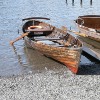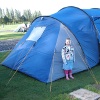Book review: The River Cottage Fish Book
3 February 2011
The River Cottage Fish Book is not just a cookery book. It's also a useful guide to anglers planning to eat their catch and to those concerned about the sustainability of the fish we eat.
It is the sustainability of the fish that makes this book stand out from all the others. UK consumers are waking up to the damage that over fishing has caused (see buying sustainable fish at a local supermarket) and many are changing their fish buying and eating habits to improve the situation. This book provides recipes using fish that would normally be discarded or whose stocks are relatively healthy so helping to ease the pressure on the popular fish. Finding somewhere that sells those fish can however be a bit of a challenge, especially if like me you are 70 miles from the sea with supermarkets being the only fishmonger in a reasonable distance, although there are some fish listed you can find at the local supermarket fish counter (or even frozen fish section).
Whilst the guide to cooking fish and recipes are suitable for everyone there is a significant amount of the book aimed at the angler. That could be the regular angler that spends every weekend fishing, or a first time day out on a tourist sea fishing boat.
The explanation on how to handle and prepare fish is very good and well explained and some of the recipes sound delicious.
My one issue with the book is the elitism with regard to the angler. Whilst their passion for fish conservation is certainly very positive (eg. Hugh's Fish Fight TV series on channel 4 has certainly raised public awareness), there are comments that it's okay for the angler to eat certain fish if they catch it themselves, but not for the consumer. There is no doubt that it is commercial fishing that has caused the problems with fishing rather than the hobby angler, and in some cases they have said they would try and return fish unharmed, but other comments appear to say that occasionally targeting endangered fish as a treat for the angler is okay, but not for the consumer to occasionally buy such fish. To use the analogy with endangered land animals, it would not be considered okay to hunt endangered tigers on the justification it was just for personal use.
The book does cater for the fish consumer as well as the angler (including tips on what to look for at the fish monger), but just makes you think that he's really writing for fellow anglers rather than consumers.
This is the only book that combines cookery with tackling the problem of overfishing and to that it deserves a lot of credit.
If you are an Angler that likes to cook fish then this is definitely the book for you! If you just like cooking and eating fish then this is good book for the concious consumer as well.








 Days Out Diary Facebook page
Days Out Diary Facebook page @DaysOutDiary on Twitter
@DaysOutDiary on Twitter